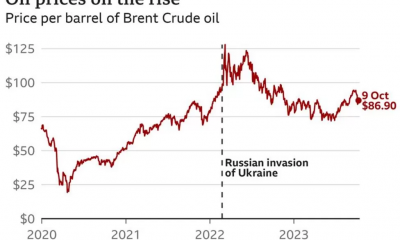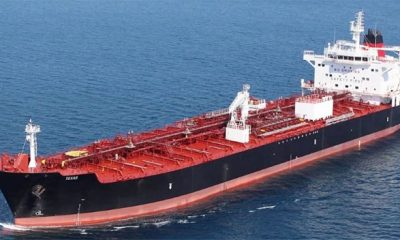Business
Oil cartel leader warns of prolonged high prices
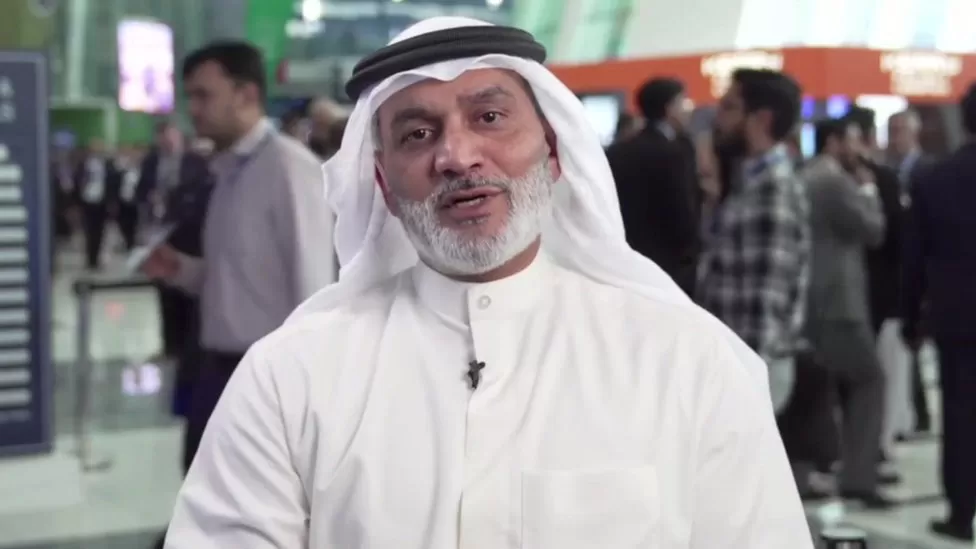
The price of oil will continue to stay elevated as demand for energy increases, says the secretary general of Opec+.
Opec+ is a group of 23 oil-exporting countries which decides how much crude oil to sell on the world market. “We see demand growing about 2.4 million barrels a day,” Haitham Al Ghais told the BBC.
Saudi Arabia said it would be cutting its production of crude oil by a million barrels a day to boost prices.
The International Energy Agency (IEA) said the decision by Saudi Arabia and Russia – two major oil producers and members of Opec+ – to cut production could cause a “significant supply shortfall” by the end of this year.
Al Ghais said: “This is a voluntary decision taken by two sovereign nations, Saudi Arabia and Russia. This decision can be described as precautionary or pre-emptive because of uncertainties”.
Following Russia’s invasion of Ukraine in February 2022, oil prices soared, hitting more than $120 a barrel in June last year. They fell back to a little above $70 a barrel in May this year, but have steadily risen since then as producers have tried to restrict output to support the market.
Brent crude, a benchmark for prices, breached $95 a barrel on Tuesday amid predictions of shorter supplies, with fears the price may breach $100 per barrel. The rise prompted a warning to drivers that fuel prices could rise in the coming 10 months, and stoked fears that inflation in key economies could be prolonged.
But Mr Al Ghais said Opec was more concerned about “under investment” in the oil sector. “Some have called for stopping investments in oil. We believe this is equally dangerous. It will lead to volatility in the future, possible supply shortages. And therefore we at Opec have always advocated for the importance of continuing to invest in the oil industry as we also invest in decarbonising the industry and move on to adding other forms of alternative energy such as renewables”.
Asked if he was concerned about rising oil prices affecting inflation around the world if it goes above $100 a barrel, Mr Al Ghais said it was “important not to look at things in a short-sighted manner”. “For next year we see demand continuing to grow north of 2 million barrels a day – of course, all subject to some of the uncertainties in the global market. Nevertheless, we still feel quite optimistic that global oil demand is going to be quite resilient this year”.
Mr Al Ghais said that the oil industry would need close to $14tn in investment to the year 2045. “Energy demand will grow by nearly 25% by the year 2045 compared to what it is today – and all forms of energy will be required”, he said.
His comments come ahead of a meeting of key oil players on Wednesday in Abu Dhabi for the International Petroleum Exhibition and Conference (ADIPEC).
(BBC)
Business
Dialog delivers strong growth, stronger national contribution in FY 2025
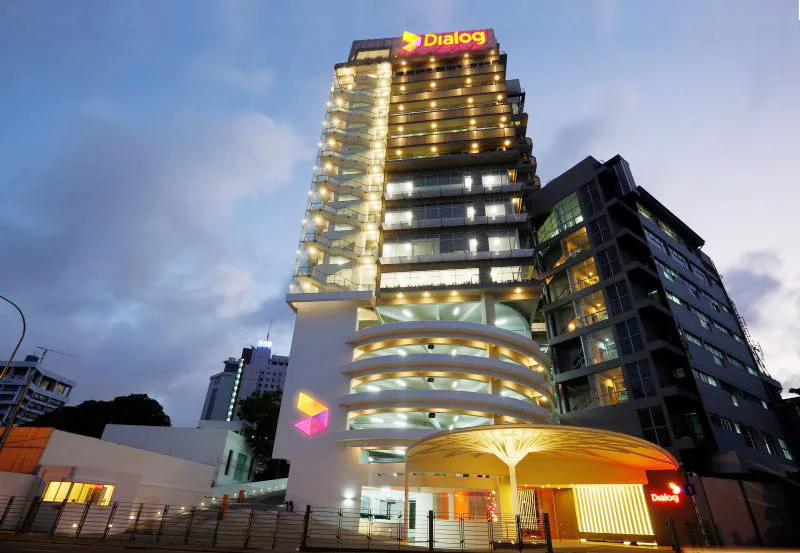
Dialog Axiata PLC announced, Friday 6th February 2026, its consolidated financial results (Reviewed) for the year ended 31st December 2025. Financial results included those of Dialog Axiata PLC (the “Company”) and of the Dialog Axiata Group (the “Group”).
Group Performance
The Group delivered a strong performance across Mobile, Fixed Line and Digital Pay Television businesses recording a positive Core Revenue growth of 16% Year to Date (“YTD”). Group Headline Revenue reached Rs179.6Bn, up 5% YTD, despite the continued strategic scaling down of low-margin international wholesale business. In Q4 2025, Revenue was recorded at Rs46.5Bn up 2% Quarter-on-Quarter (“QoQ”) and 2% Year-on-Year (“YoY”).
The Group Earnings Before Interest, Tax, Depreciation and Amortisation (“EBITDA”) reached Rs86.0Bn up 30% YTD supported by Core Revenue performance and Cost Rescaling Initiatives. On a QoQ basis Group EBITDA demonstrated a modest growth to record at Rs23.0Bn up 2% QoQ with an EBITDA margin of 49.5% in line with the Revenue performance. Group EBITDA margin reached 47.9% for FY 2025, up 9.2pp.
Group Net Profit After Tax (“NPAT”) reached Rs20.8Bn for FY 2025, up 67% YTD mainly resulting from robust EBITDA growth, despite higher tax and net finance costs. Normalized for forex impact, NPAT growth was recorded at +>100% YTD to reach Rs22.1Bn. On a QoQ basis NPAT grew 3% to reach Rs5.9Bn resulting from strong EBITDA performance.
On the back of strong operational performance, the Group recorded Operating Free Cash Flow (“OFCF”)
of Rs49.3Bn for FY 2025 up >100% YTD.
Dividend Payment to Shareholders
In line with the dividend policy and financial performance of the Group and taking into account the forward investment requirements to serve the nation’s demand for Broadband and Digital services, the Board of Directors of Dialog Axiata PLC at its meeting held on 6th February 2026, resolved to propose for consideration by the Shareholders of the Company, a dividend to ordinary shareholders amounting to Rs1.50 per share. The said dividend, if approved by shareholders, would translate to a Dividend Yield of 5.0% based on share closing price for FY 2025. The dividend so proposed will be considered for approval by the shareholders at the Annual General Meeting (AGM) of the Company, the date pertaining to which would be notified in due course.
Company and Subsidiary Performance
At an entity level, Dialog Axiata PLC (the “Company”) continued to be the primary contributor to Group Revenue (76%) and Group EBITDA (74%). Aided by sustained growth in the Data segment and cost-rescaling initiatives, Company revenue was recorded at Rs135.8Bn for FY 2025, up 18% YTD, EBITDA rose 32% YTD to reach Rs63.6Bn. On a QoQ basis, Q4 2025 Revenue was recorded at Rs34.8Bn, down 1% QoQ due to a reclassification of Hubbing Revenue, while EBITDA decline 1% QoQ to record Rs17.0Bn, largely attributable to network restoration costs and donations made in relation to the Cyclone Ditwah relief efforts. Furthermore, NPAT was recorded at Rs15.6Bn for FY 2025, up 41% YTD. Normalised for forex impacts, the company NPAT was up +>100% YTD to reach Rs17.0Bn. On a QoQ basis, Company NPAT was recorded at Rs4.5Bn, down 6% QoQ.
Business
Ceylinco Life’s Pranama Scholarships reach 25-year milestone
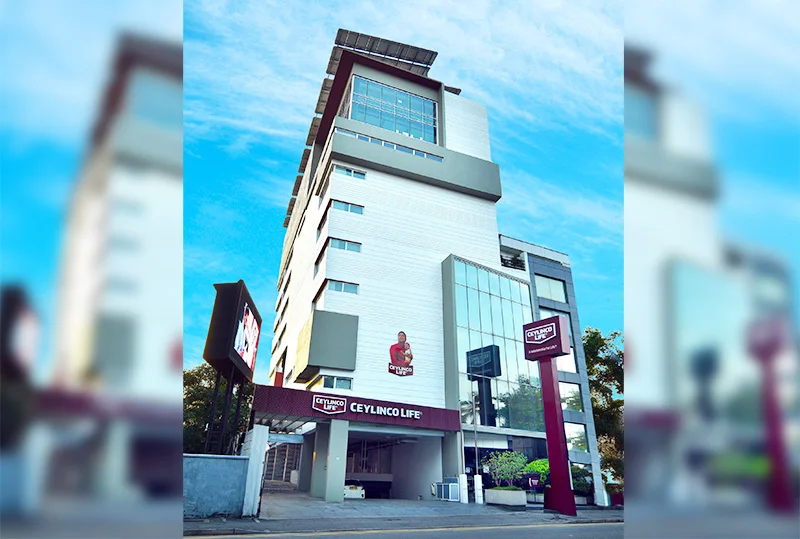
Ceylinco Life has announced the launch of the 25th consecutive edition of its flagship Pranama Scholarships programme, marking a significant milestone in the company’s long-standing commitment to recognising and rewarding excellence among the children of its policyholders.
Under the 2026 programme, the life insurance market leader will present scholarships with a total cumulative value of Rs. 22.7 million, continuing a rewards initiative that has now been conducted without interruption for a quarter of a century. Since its inception, the Ceylinco Life Pranama Scholarships programme has benefitted 3,466 students across the country, representing a total investment of Rs. 240 million in nurturing academic achievement and outstanding performance in sports, arts and other extracurricular pursuits.
Business
Sri Lankans’ artistic genius glowingly manifests at Kala Pola ‘26

The artistic genius of Sri Lankans was amply manifest all over again at ‘Kala Pola ‘26’ which was held on February 8th at Ananda Coomaraswamy Mawatha Colombo 7; the usual, teeming and colourful venue for this annual grand exhibition and celebration of the work of local visual artists.
If there is one thing that has flourished memorably and resplendently in Sri Lanka over the centuries it is the artistic capability or genius of its people. It is something that all Sri Lankans could feel a sense of elation over because from the viewpoint of the arts, Sri Lanka is second to no other nation. With regard to the visual arts a veritable dazzling radiance of this inborn and persisting capability is seen at the annual open air ‘Kala Pola’.
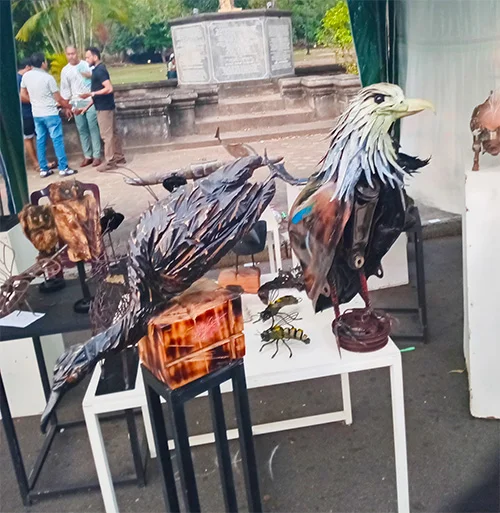
A bird of Sri Lanka created from scraps of iron waste.
All capable visual artists, wherever they hail from in Sri Lanka, enjoy the opportunity of exhibiting their work at the ‘Kala Pola’ and this is a distinctive ‘positive’ of this annual event that draws numberless artists and viewers. There was an abundance of paintings, sketches and sculptures, for instance, and one work was as good as the other. Ample and equal space was afforded each artist. Its widely participatory and open nature enables one to describe the exhibition as exuding a profoundly democratic ethos.
Accordingly, this time around at ‘Kala Pola ‘26’ too Sri Lankans’ creative efforts were there to be viewed, studied and enjoyed in the customary carnival atmosphere where connoisseurs, local and foreign, met in a sprit of camaraderie and good cheer. Many thanks are owed once again to the George Keyt Foundation for the presentation of the event in association with the John Keells Group and the John Keells Foundation, not forgetting the Nations Trust Bank, which was the event’s Official Banking Partner. The exhibition was officially declared open by Chief Guest Marc-Andre Franche, UN Resident Coordinator in Sri Lanka.
By Lynn Ockersz
-

 Features2 days ago
Features2 days agoMy experience in turning around the Merchant Bank of Sri Lanka (MBSL) – Episode 3
-

 Business3 days ago
Business3 days agoZone24x7 enters 2026 with strong momentum, reinforcing its role as an enterprise AI and automation partner
-

 Business2 days ago
Business2 days agoRemotely conducted Business Forum in Paris attracts reputed French companies
-

 Business2 days ago
Business2 days agoFour runs, a thousand dreams: How a small-town school bowled its way into the record books
-

 Business2 days ago
Business2 days agoComBank and Hayleys Mobility redefine sustainable mobility with flexible leasing solutions
-

 Business3 days ago
Business3 days agoHNB recognized among Top 10 Best Employers of 2025 at the EFC National Best Employer Awards
-

 Business3 days ago
Business3 days agoGREAT 2025–2030: Sri Lanka’s Green ambition meets a grid reality check
-

 Editorial5 days ago
Editorial5 days agoAll’s not well that ends well?




